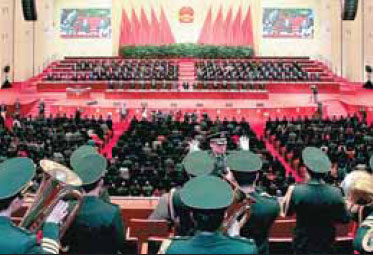Pudong seeks to spark innovation in FTZ
|
A military band plays at the opening ceremony of the second session of the 14th Shanghai People's Congress on Sunday. Zhu Gang / for China Daily |
The first law effective only in Shanghai's Pudong New Area, expected this year, will ensure and encourage innovation in the free trade zone, a top Pudong official said.
"Some company heads and entrepreneurs in the FTZ have bold business ideas that might go beyond the existing legal system. They don't dare 'run the red light'," said Pudong Party secretary Shen Xiaoming during the second session of the 14th Shanghai People's Congress, the city's legislature, which opened on Sunday.
Because some new initiatives are against current regulations, lawmakers in Pudong will ask the municipal congress to allow them, Shen said.
Pudong is a product of reforms since 1990, Shen said. "However, the reform 24 years ago relied on privileges that were not granted to other places, and today's relies on innovations, which require courage and wisdom," he said.
Shen did not give a timetable for the new law. But Yin Yicui, head of the Standing Committee of the Shanghai People's Congress, said in November that the city will discuss details of the FTZ policies and make them law as early as June.
State enterprises will benefit most from the upcoming law, some congress deputies said.
"Some executives of State enterprises are afraid of making mistakes and assuming responsibility in the process of innovation, so they stand still," said Wu Jian, of the Duan & Duan Law Firm.
"They'll be encouraged to make more bold innovations if some mistakes are allowed when they work on pilot programs," he said.
To give full play to the exemplary role of the FTZ, Shanghai has to speed up its development immediately, as other cities, including Tianjin, Guangzhou and Shenzhen, are applying to establish similar zones and will introduce new innovative measures, some lawmakers said.
Moreover, Shanghai must look abroad at other free trade zones when building its own FTZ up to international standards, deputy Nie Ming said.
"Japan is considering establishing a special zone of finance in Tokyo with the clear objective of shaping the world's most attractive business and trade environment and building it into Asia's financial center," said Nie, who is also vice-president of Mizuho Bank (China) Ltd.
"Planners of the Tokyo zone are looking at Shanghai as an opponent and studying the Shanghai FTZ. Shanghai also needs to observe other countries and regions, such as Singapore and Hong Kong, to keep competitive," he said.
Shanghai Mayor Yang Xiong said at the opening ceremony of the annual meeting that the city will make an all-out effort to build the FTZ.
"We will take the lead in making new breakthroughs in key fields and develop a series of new systems that are replicable and scalable in the free-trade zone," Yang said.
Xu Bin, a professor of economics and finance at the China Europe International Business School, said a November survey of more than 1,000 businesses showed that 45 percent of domestic business and 21 percent foreign companies are bullish on the Shanghai FTZ.
"More efficient government service is the most anticipated change that investors want to see in the FTZ," Xu said in a speech at the school on Saturday.
Although the central bank has issued supportive policies for financial reform in the FTZ, Xu said it will be hard for detailed rules of such reform to be practiced in the area.
Wei Tian in Shanghaicontributed to this story.
zhouwenting@chinadaily.com.cn



















